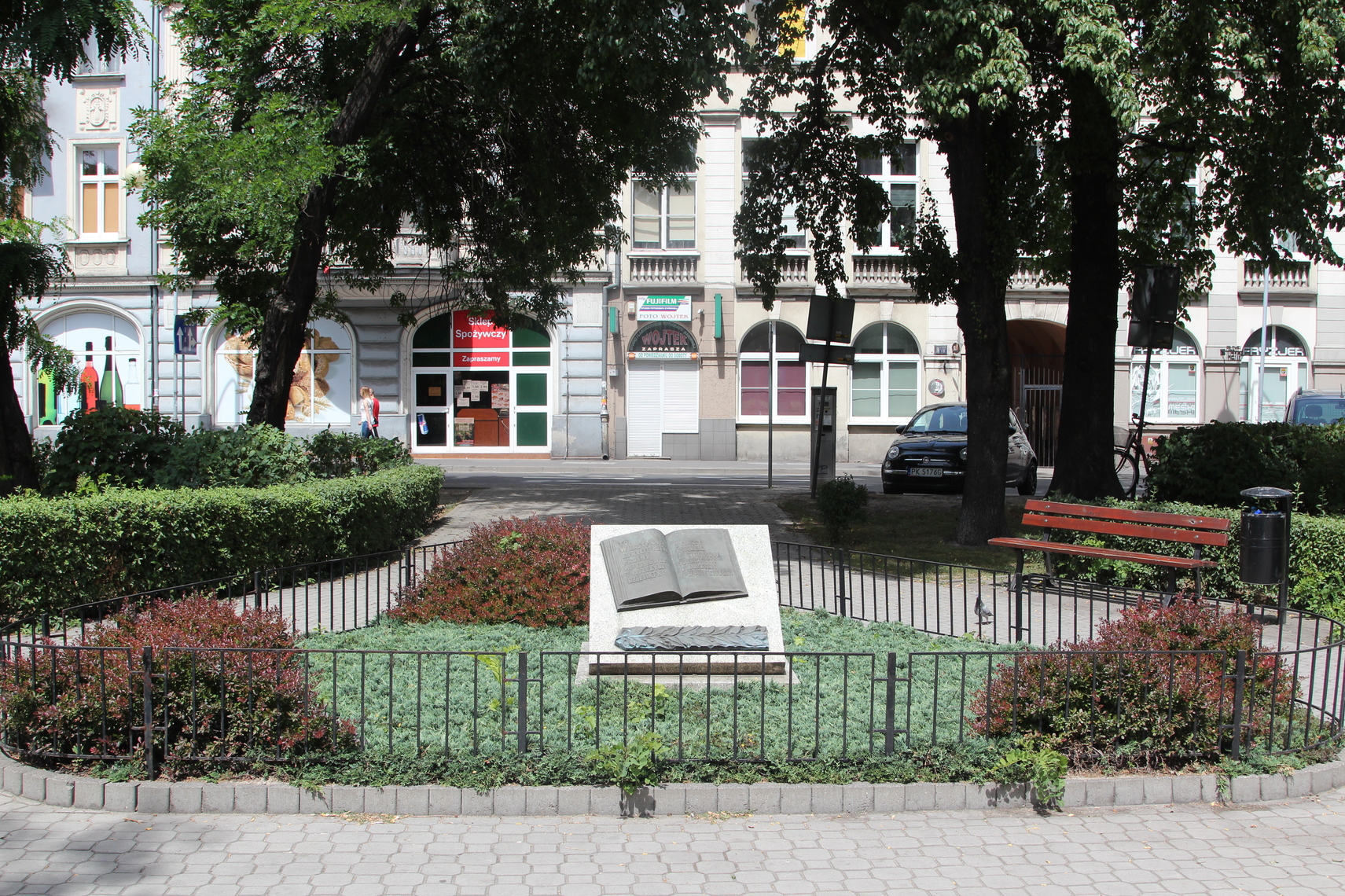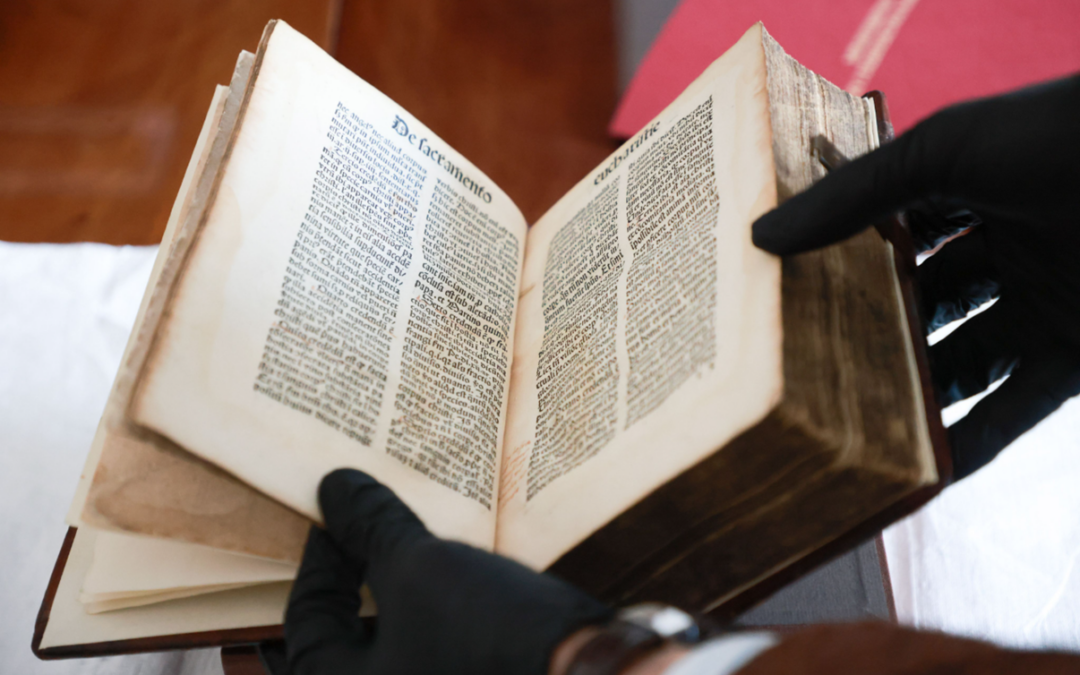Keep our news free from ads and paywalls by making a donation to support our work!

Notes from Poland is run by a small editorial team and is published by an independent, non-profit foundation that is funded through donations from our readers. We cannot do what we do without your support.
A 15th-century book that was one of tens of thousands to disappear from a Polish city during the wartime Nazi-German occupation has been returned after turning up at an auction in Warsaw last year.
The item in question is a collection of religious texts published in the late 1400s by Martin Flach, a Swiss printer, in the form of an incunabulum, an early type of printed book. It includes works by Thomas Aquinas, Bonaventure, and Nicholas of Błonie, a Polish theologian.
Zabytkowy inkunabuł powrócił do Muzeum Okręgowego Ziemi Kaliskiej w Kaliszu
Zbytkowy starodruk powrócił dziś do zbiorów Muzeum Okręgowego Ziemi Kaliskiej w Kaliszu dzięki działaniom restytucyjnym Ministerstwa Kultury i Dziedzictwa Narodowego. Późnośredniowieczny inkunabuł,… pic.twitter.com/eKmQPvCC2C
— Ministerstwo Kultury i Dziedzictwa Narodowego (@kultura_gov_pl) April 23, 2025
By the early 20th century, the item had come into the possession of Jan Sobczyński, a Polish priest and book collector in the city of Kalisz. Sometime before 1930, he donated it, along with other parts of his collection, to the district museum in the city.
However, during the subsequent German occupation, Kalisz, like other parts of Poland, saw its cultural holdings decimated by destruction and looting. In the first year of the war, over 80% of the collections of the city’s museums were destroyed.
Later, in 1942, German soldiers threw thousands more books from local libraries, museums and private homes into a canal. A monument now stands in the city centre commemorating that act of destruction.

Memorial in Kalisz to books destroyed by the German occupiers in World War Two (Fallaner/Wikimedia Commons, under CC BY-SA 4.0)
This particular incunabulum was among the books that disappeared during the war. However, last year it appeared at an online auction run by a Warsaw antique shop.
The item was noticed by Przemysław Pawlak, deputy head of the literary department at the National Theatre in Warsaw, who informed the ministry of culture and national heritage, which oversees efforts to locate the hundreds of thousands of cultural items still missing after World War Two.
After confirming the provenance of the item, ministry employees contacted its owner, artist Krzysztof Burnatowicz, who, after learning of its origin, decided to return it to the museum in Kalisz.
No information has been released as to how the book came into Burnatowicz’s possession or of what happened to it during and after the war.
This is a final appeal for our emergency campaign to save Notes from Poland.
Next week, we may lose the major grant that sustains our work.
If you value the service we provide, please click below and make a donation to help it continue https://t.co/0gVkMlaA0W
— Notes from Poland 🇵🇱 (@notesfrompoland) April 22, 2025
“Negotiations with the owner of the item were not easy because the museum’s prewar inventory of books is missing and there was no easy way to prove that it was part of our collection,” the museum’s director, Marcin Magdziński, told the Gazeta Wyborcza daily.
However, a local newspaper article from 1930 was discovered that mentions the work as being in the library’s collection. The book itself also contains a handwritten note saying that it belonged to the collection of Sobczyński.
The item was returned last week to the museum, which plans to display it to the public on 17 May during the annual “Night of Museums”, a nationwide initiative in which cultural institutions open their doors to the public at night and put on special events and exhibitions.
A work by Italian baroque painter Alessandro Turchi that was looted by Nazi Germany during WWII has been returned to Poland from Japan.
The painting was discovered by the Polish culture ministry after appearing at auction in Tokyo https://t.co/A1liP1PQGj
— Notes from Poland 🇵🇱 (@notesfrompoland) June 1, 2023
Poland has stepped up efforts in recent years to recover surviving works of art and other cultural artefacts that went missing during the German and Soviet occupations of World War Two.
In 2023, it secured the return of a work by Italian baroque painter Alessandro Turchi that was looted by Germany during the war and had ended up at auction in Japan.
Last year, the Polish culture ministry confirmed that efforts are underway to secure the return of 73 historical documents – including a 15th-century peace treaty between Poland, Lithuania and the Teutonic Knights – that were looted in World War Two and are currently being held in a Berlin archive.
Poland is seeking the restitution of 73 historical documents – including a 15th-century peace treaty between Poland, Lithuania and the Teutonic Knights – that were looted by Germany in WWII and are currently being held in a Berlin archive https://t.co/nXjusudY6O
— Notes from Poland 🇵🇱 (@notesfrompoland) October 11, 2024

Notes from Poland is run by a small editorial team and published by an independent, non-profit foundation that is funded through donations from our readers. We cannot do what we do without your support.
Main image credit: MKiDN (under CC BY-NC-ND 3.0 PL)

Daniel Tilles is editor-in-chief of Notes from Poland. He has written on Polish affairs for a wide range of publications, including Foreign Policy, POLITICO Europe, EUobserver and Dziennik Gazeta Prawna.



















